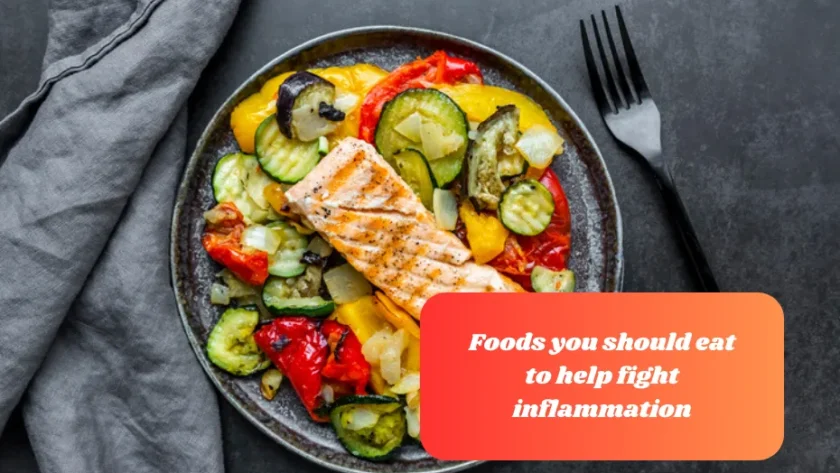Inflammation is a normal way for the body’s immune system to react to harm, infection, or damage.
Acute inflammation is necessary for mending, but chronic inflammation can lead to heart disease, diabetes, and autoimmune diseases, among other health problems.
What you eat is very important for controlling inflammation. Eating foods that reduce inflammation can help lower the risks of chronic inflammation and improve your health and well-being as a whole.
Fruits and Vegetables
Fruits and veggies are great for fighting inflammation because they are full of minerals, vitamins, and antioxidants.
It’s especially strong in berries like blueberries, strawberries, and raspberries because they have a lot of anthocyanins, which lower signs of inflammation.
Leafy greens like spinach, kale, and Swiss chard are great ways to get vitamins A, C, and K. These vitamins can help reduce inflammation.
Also, cruciferous veggies like broccoli, Brussels sprouts, and cabbage have a chemical called sulforaphane that is known to reduce inflammation.
Eating a variety of brightly colored fruits and veggies will give you a lot of different nutrients and phytochemicals that work together to lower inflammation.
Whole Grains
Eating whole grains is an important part of a diet that reduces inflammation. Whole grains, not processed grains, keep their fiber, vitamins, and minerals, which are important for keeping your gut healthy and lowering inflammation.
Some easy whole grains that you can easily add to your meals are oats, brown rice, quinoa, and barley. People who eat a lot of these foods can lower their amounts of C-reactive protein (CRP), a protein that shows how inflamed their bodies are.
The anti-inflammatory benefits of whole grains are also helped by the vitamins they contain, like ferulic acid and phytic acid. Whole grains can help reduce inflammation and keep your heart and gut system healthy when you eat them regularly.
Healthy Fats
When it comes to lowering inflammation, healthy fats, especially those high in omega-3 fatty acids, are very important.
Omega-3 fatty acids, which can be found in fatty fish like salmon, mackerel, and sardines, are known to stop the production of chemicals that cause inflammation and boost the body’s own anti-inflammatory reaction.
Chia seeds, flaxseeds, peanuts, and other plant-based sources of omega-3s are also good for you. Along with omega-3s, monounsaturated fats like those in olive oil, eggs, and nuts also help reduce inflammation.
These good fats lower the amounts of inflammation markers and make heart health better in general. To add these fats to your diet, all you have to do is add a handful of nuts to your salad, drizzle olive oil over veggies, or plan your meals around fatty fish.
Herbs and spices
Not only do spices and herbs make food taste better, they are also very good at reducing inflammation. Curcumin, which is found in turmeric, is one of the most powerful anti-inflammatory medicines.
Curcumin has been shown in studies to stop inflammatory processes and ease the signs of diseases like gout and inflammatory bowel disease.
Ginger is another spice that is often used to treat osteoarthritis and joint pain because it has strong anti-inflammatory qualities. Garlic and cinnamon are two other helpful herbs and spices.
Garlic has sulfur chemicals that stop inflammatory enzymes from working, and cinnamon has been shown to lower inflammation and oxidative stress.
If you use these spices and plants in your daily cooking, they will make your diet much more anti-inflammatory.
Seeds and nuts
There are a lot of nutrients in nuts and seeds, and they are good for you in many ways, including reducing inflammation.
Flaxseeds, chia seeds, sunflower seeds, and almonds are all good sources of healthy fats, fiber, and vitamins.
Together, these nutrients help lower inflammation and keep your health in general good. As an example, walnuts have alpha-linolenic acid (ALA), which is an omega-3 fatty acid that helps lower signs of inflammation.
Flaxseeds and chia seeds are great sources of fiber and lignans, both of which help reduce inflammation.
Eating nuts and seeds on a regular basis has been linked to lower amounts of CRP and other inflammatory markers, as well as a lower chance of getting long-term diseases like diabetes and heart disease.
Including a range of nuts and seeds in your meals, whether as snacks, soups, or drinks, can help reduce inflammation in a big way.
Conclusion:
Adopting an anti-inflammatory diet means choosing the foods you eat in a regular and thoughtful way.
Getting more fruits and veggies, whole grains, healthy fats, spices, nuts, and seeds can help a lot with reducing chronic inflammation and the health risks that come with it.
Focusing on a varied and well-balanced diet full of these anti-inflammatory foods can help your body’s natural defenses, improve your health as a whole, and maybe even stop the start of some chronic conditions.
When making any changes to your diet, it’s important to think about your own health needs and talk to a doctor or expert to find the best anti-inflammatory diet plan for you.
1. What are the best foods to eat to help fight inflammation?
The best foods to eat to help fight inflammation include fruits and vegetables rich in antioxidants like berries and leafy greens, whole grains such as oats and quinoa, healthy fats from sources like fatty fish and olive oil, and anti-inflammatory spices like turmeric and ginger. Including a variety of these foods in your diet can significantly reduce inflammation and improve overall health.
2. How can I incorporate anti-inflammatory foods into my daily diet?
Incorporating anti-inflammatory foods into your daily diet is simple and delicious. Start by adding more colorful fruits and vegetables to your meals, switching to whole grains, and using olive oil for cooking. Snack on nuts and seeds, include fatty fish like salmon in your weekly meal plan, and season your dishes with anti-inflammatory spices such as turmeric and ginger. These small changes can make a big difference in managing inflammation and enhancing your well-being.

